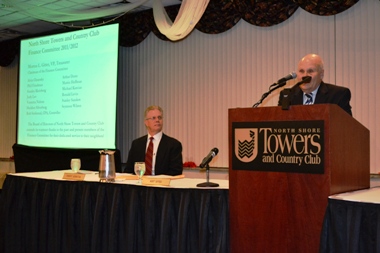While Towers residents can expect shortfalls in the budget this year, the end of 2011 saw an excess of revenue over expenditures.
“Budgeting is really not a true science. I would consider it more of an art,” said Mort Gitter, Board member and finance committee chair. “You can budget in a couple of ways. Over the years, we’ve adopted a slightly different approach with three components. Our primary aim is to maintain and preserve the financial integrity at North Shore Towers.”
At last month’s open finance meeting, Gitter addressed highlights of the 2011 budget and expectations for 2012, adding that for the third year in a row, there will be no maintenance or Country Club increases.
“We are committed to keeping North Shore Towers as a luxury complex,” Gitter said at the December 15 meeting. “But in order to maintain a luxury complex, you’ve got to spend money. We have to figure in our budgeting process how much money we can spend — taking into consideration the financial soundness of the community to keep this place running as a top notch facility, which does of course preserve shareholder value.
“Sometimes it works out, and sometimes it doesn’t. But believe me, we give it our best shot,” said Gitter.
The co-op anticipates having an excess of revenues over expenditures of about $340,000, which Gitter said is “incidentally less than one percent of the amount of our budget.”
“That’s very, very close to being 100 percent accurate,” he said.
Revenues from operations in the year 2011 totaled $43,240,000, Gitter explained, while operating expenditures in 2011 approximated $42.9 million.
Gitter attributes this excess to fuel, water, real estate taxes and insurance costs in 2011 being slightly less than projected expenditures.
“That’s the reason. There’s no mystery to it,” he said.
However, due to major projects in the works for 2012 — along with rises in costs from major components of 2012 expenses — the co-op will see a shortfall of about $835,000.
Gitter said projected operation revenues for 2012 will be $43.4 million, and projected operation expenditures will come to $44,235,000.
He also said the 2012 projected expenses will exceed those in 2011 by approximately $1.3 million due to increases in wages and benefits, water rates, real estate taxes and building repairs.
Specifically, he said wages and benefits will go up by $350,000, as water and sewer rates, along with service contracts — work done by outside firms including the elevators and landscaping — continue to escalate.
He said repairs are going to be up in excess of $200,000 and real estate taxes for the community are projected to rise by approximately $700,000.
“Unfortunately, we still have to pay more taxes each year then we paid in the prior year. So even with all of the activity that goes on, our real estate taxes are rising, but hopefully at a decelerated rate of increase than what we have encountered in the past,” Gitter said.
However, Gitter said there are several ways to accommodate for this, without having residents suffer maintenance fee increases.
The majority of the money will come from the operating reserves — a fund that was created by shareholders a number of years ago and was designed primarily to guard against unforeseen cash shortages arising from spikes in fuel or operating costs.
This fund has built up to a point where it exceeds $4 million, Gitter said.
“For a number of months, we have wrestled with how to remedy this shortfall,” he said. “Normally, we do not advocate taking funds from our operating reserves to remedy shortfalls. There’s a lot of danger in that because once you start dipping into the till and taking money from your reserves, that accelerates year after year and it doubles up. So the fact is that you might cure [the shortfall] in one year, and you have a double problem in the following years. As a result of which, we have continuously resisted the temptation of taking any money from our reserves to remedy any shortfall that we may have.”
But this year is the exception, Gitter said, adding that this reserve fund is different from the capital improvement and emergency reserve funds.
“In the event that we encounter any cash problems in the year, we could take some of this money and not have to come back through the shareholders to pay our bills. We didn’t think it was fair that if we have this fund that at some point we would not take advantage of it,” Gitter said.
The co-op is also up for refinancing its mortgage — a one in 10 year event, said Gitter.
“Nothing is sure in this world, but we have a pretty good handle of what the market will be, and that we will save a significant sum of money in the refinancing over our current rate,” he said. “As the result of which, in 2013, our expenses should be less than they are now, since we are advertising a portion of our mortgage to the tune of approx $1.2 billion a year. We will save that money in 2012.”
Gitter said this also quenches the original fear of doubling up on debt from dipping into funds.
“When you add it all up, in the event that we take a shortfall in 2012 and you take [money] from the reserve fund, you will not be doubling up because when you add 2012 and 2013, the savings and expenses in 2013 will pretty well balance out,” he said. “We have resisted for many years, but we have a once in a long time opportunity to do it without any material adverse effect upon the finances of this cooperation. This obviously bestows a very significant financial benefit to each of you and all of the shareholders.”
In 2012, the co-op also expects to spend approximately $2,120,000 on capital improvement projects — a budget that Gitter says is “somewhat below” the monies spent in 2011.
“There’s a reason for that, and it’s not because things are not getting done or that we are not going to do them,” he said. “It’s just so much work that can be done around here without totally disrupting the lives of all of us. Everybody in this room has been subjected to the ramps, with the hammering and drilling. Next year, we’re going to have scaffolding.”
He said there is a “whole host of other capital expenditures that will be made,” but the capacity to do them is limited.
“All of the capital improvements will be done at the proper time, with minimal inconvenience to our shareholders,” he said.
These projects include but are not limited to upgrading a boiler, which is projected to cost about $680,000; fixing sidewalks and drains in the parking area in front of the buildings, said to cost $425,000; and improving movie theatre seating, which will total $75,000.
“We all are extremely proud that our reserves are at a point that they give us confidence in knowing that we can meet our immediate needs comfortably,” Gitter said.
In 2011, the capital improvement fund saw $7.1 million, and Gitter said the fund will increase to $7.5 million in the year 2012.
The emergency reserve fund is “stable,” Gitter said, and will increase from $3 million to $3.1 million in the new year.
The only fund that will see a decrease is the operating reserve fund, which Gitter explained will be used to fund the 2012 deficiencies. Currently, it has $4.6 million. By the end of 2012, it will have $3.8 million.
In total, there were $17.6 million worth of funds in 2011, and 2012 is expected to see $17.3 million.
“There’s no magic to it,” Gitter said. “We’ve operated efficiently and in addition, we have been able to save very, very substantial sums of money than our expenditures.”






























